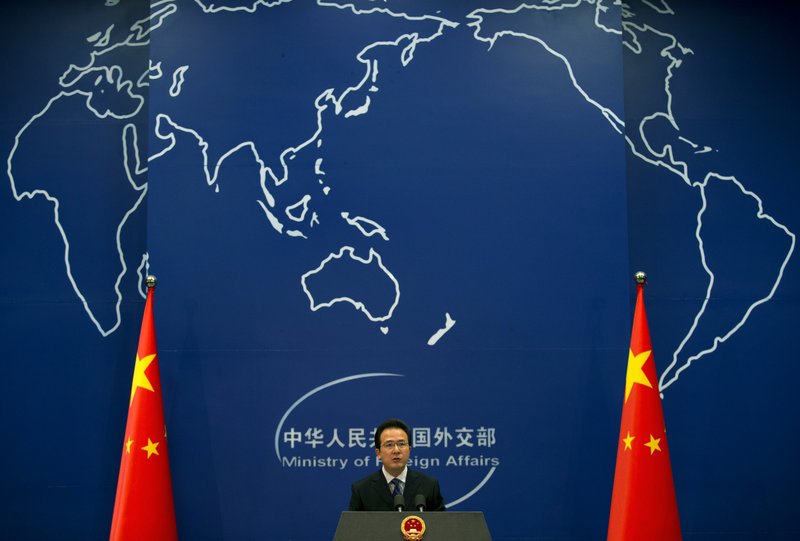BEIJING -- China said Thursday that it is entitled to keep watch over airspace and seas surrounding artificial islands it created in the disputed waters of the South China Sea, after an exchange in which its navy warned off a U.S. surveillance plane.
The United States said its aerial patrolling was in accordance with international law.
The comments came as the Chinese air force announced its latest offshore training exercises in the western Pacific as part of efforts to boost its combat preparedness. An air force spokesman said that followed an initial offshore drill held last month and future such exercises would likely be planned.
A news crew from CNN reported it witnessed an exchange Wednesday in which a Chinese navy dispatcher demanded eight times that a U.S. Navy P8-A Poseidon surveillance aircraft leave the area as it flew over Fiery Cross Reef, where China has conducted extensive reclamation work. It said the U.S. crew members responded that they were flying through international airspace, to which the Chinese dispatcher answered: "This is the Chinese navy. ... You go!"
CNN said it was given permission to board the surveillance flight because the U.S. wants to raise awareness of China's island building project. It also said it was the first time the Pentagon had declassified audio of the Chinese making such challenges. The Center for Strategic and International Studies think tank posted more video Thursday of the aerial patrol above the Spratly island chain, which it said had been released by the U.S. Navy.
Speaking at a regular daily briefing, Chinese Foreign Ministry spokesman Hong Lei reiterated Beijing's insistence on its indisputable sovereignty over the islands it has created by piling sand on top of atolls and reefs.
While saying he had no information about the reported exchange, Hong said China was "entitled to the surveillance over related airspace and sea areas so as to maintain national security and avoid any maritime accidents."
"We hope relevant countries respect China's sovereignty over the South China Sea, abandon actions that may intensify controversies and play a constructive role for regional peace and stability," Hong said.
In Washington, State Department spokesman Marie Harf said: "I saw the video. I don't think I'd call it a confrontation. There were certainly verbal warnings given by the Chinese. It's unclear on what basis they issued these warnings.
"U.S. military planes operate in accordance with international law in disputed areas of the South China Sea. So the U.S. military has and will continue to operate consistent with the rights, freedoms and lawful use of the sea in the South China Sea," she said.
China's construction has intensified friction among competing parties in the South China Sea, which Beijing claims virtually in its entirety along with its scattered island groups. The area that is home to some of the world's busiest commercial shipping routes is also claimed in part or in whole by the Philippines, Taiwan, Brunei, Malaysia and Vietnam.
The U.S. and most of the 10 members of the Association of Southeast Asian Nations want a halt to the projects, which they suspect are aimed at building islands and other land features over which China can claim sovereignty and base military assets.
The U.S. says it takes no position on the sovereignty claims but insists they must be negotiated. Washington also says ensuring maritime safety and access is a U.S. national security priority.
China is also at odds with Japan over ownership of a group of uninhabited islands in the East China Sea that are controlled by Tokyo but also claimed by Beijing, leading to increased activity by Chinese planes and ships in the area, which lies between Taiwan and Okinawa.
Both sides have accused the other of operating dangerously, prompting fears of an occurrence such as the 2001 collision between a Chinese fighter jet and a U.S. surveillance plane in which the Chinese pilot was killed and the American crew detained on China's Hainan island.
Chinese air force spokesman Shen Jinke said Thursday's exercises were held in international airspace but gave no specifics. In its report on the drills, state broadcaster CCTV showed a video of Xian H-6 twin-engine bombers in flight and landing at an air base, although it wasn't clear when the video was shot.
China raised tensions in November 2013 when it declared an air defense identification zone over a large area of the East China Sea that would require foreign aircraft to announce their flight plans and follow Chinese instructions.
Information for this article was contributed by Matthew Pennington of The Associated Press.
A Section on 05/22/2015
